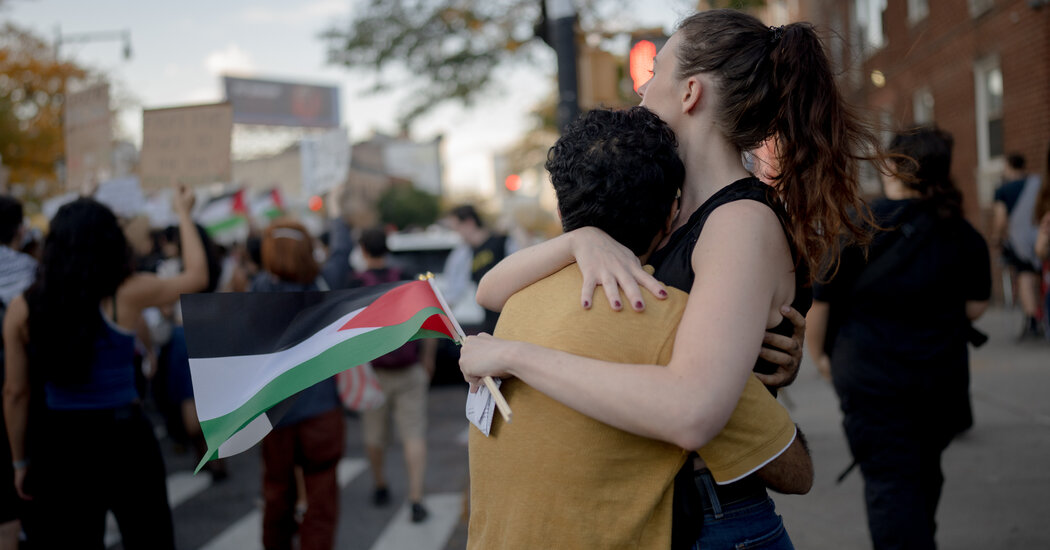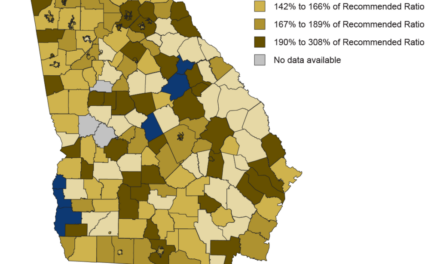
The savage terrorist attack on Israel and the ensuing war in Gaza are spurring many young Americans to engage with the political moment at a heightened intensity that could, ultimately, influence the 2024 presidential race. President Biden is offering fulsome support to Israel, though with more words of caution recently. Yet according to multiple recent polls, fewer than a quarter of young voters — who were crucial to Democratic victories in 2020 and overperformance in 2022 — approve of the way that the president is handling the response to the war between Israel and Hamas.
In an Economist/YouGov survey of U.S. adults, more than a third of respondents ages 18 to 29 reported that the Israeli government’s response to the Oct. 7 attacks that claimed 1,400 lives is “too harsh.” Each day Israel bombards Gazans and the United States is not viewed as a peacemaker, Mr. Biden’s political position takes a hit with younger voters who see the war largely through the life-or-death prism of human rights.
To be clear, most 20- and 30-somethings agree that Hamas committed war crimes in Israel. Most do not look at this as an either/or situation: They want America to help both the Israeli and the Palestinian people. But young progressives remain unconvinced of their government’s commitment to safeguarding the innocent. If that continues, the winning Biden 2020 coalition is at greater risk of fracturing — and in the process, making Donald Trump’s return to the White House more likely.
Many young voters have been reluctant to back Mr. Biden for some time now, despite record-setting levels of support from Gen Zers and millennials in 2020. The latest battleground state polls by The New York Times and Siena College show Mr. Biden holding a one-point lead over Mr. Trump among registered voters under 30 and a six-point lead among likely voters in the same age category. In 2020, exit polls showed Mr. Biden winning the youth vote cohort, 60 to 36 percent.
A vexing challenge for the administration has been connecting with the young, diverse electorate and persuading them to see its achievements. According to the Pew Research Center, adults between the ages 18 and 29 have been following current events less closely than when Mr. Trump was in office: Fewer than one-fifth of Americans under age 30 reported following the news regularly last year.
Whether it’s due to faltering confidence in institutions like the government and the media or simply about protecting one’s mental health from seemingly relentless cycles of bad news, the result is the same: In 16 focus groups I’ve led recently, young voters told me they are more aware of society’s chaos and conflicts than they are of what the president argues is a record of progress, millions of good jobs and a robust G.D.P. Even as he has canceled $127 billion in student debt and made headway on the economy, climate, marijuana and gun safety goals, Mr. Biden finds himself playing more defense than offense with a demographic skeptical that he is doing enough to make their lives better or make the country a more just place.
When it comes to the war, many young Americans have experienced the violent conflict through videos uploaded by other young people to TikTok, YouTube and other social media, which have an intensity and immediacy that history lessons about geopolitics might lack. Just as young people were shocked into action after witnessing George Floyd’s murder in 2020, many zoomers and millennials today cannot unsee the brutality of Oct. 7 — nor will they turn away from the plight of Palestinian women, children and older adults who have become Hamas’s human shields.
To be sure, most young voters who seek a cease-fire do not condone the barbaric acts of Hamas. But according to recent polling from CBS News, younger Americans are more likely than older generations to have roughly equal levels of sympathy for the Israeli people and the Palestinian people. At the same time, at this stage, a majority of Gen Zers and millennials believe that U.S. support for Israel makes the Middle East more dangerous.
It’s important to place these opinions into the context of this unique American moment. If you spend enough time with young people, you will most likely hear them espouse what I call the modern trickle-down effect theory. This concept is a twist on the Reagan-era theory where wealth flowed from the top down. Today many young people see wars, problems and mistakes originating from the older generations in top positions of power and trickling down to harm those most vulnerable and least equipped to protect themselves. This is the fabric that connects so many young people today, regardless of ideology. This new generation of empowered voters is therefore asking across a host of issues: If not now, then when is the time for a new approach?
All of this is unfolding against the backdrop of the 2024 presidential campaign. Many young voters are already actively entertaining the alternative, independent candidacies of Robert F. Kennedy Jr. and Cornel West. According to a new Quinnipiac University poll last week, upwards of 40 percent of registered voters under 35 indicate they are supporting Mr. Kennedy and his anti-establishment message or Mr. West, the public intellectual and author, in a hypothetical matchup against Mr. Biden and Mr. Trump.
Young people are turning to social media and seeing the noted conspiracy theorist Mr. Kennedy railing against the elites and rallying “millennials and Gen Z” who have never felt at home in the two-party system and “are repelled by the toxicity, the pettiness and, more than anything else, by the dishonesty” of politics today. And they’re seeing Mr. West demand “freedom across the board” and “equal dignity, equal rights and equal status for Palestinians and Israelis.” Messages like those are sticking with some of the young, independent-minded battleground state voters I have been talking with in focus groups.
Biden Democrats can take some solace in a few facts. Mr. Biden is competitive in polls; in the Quinnipiac poll showing strong youth interest in Mr. Kennedy and Mr. West, Mr. Biden led Mr. Trump narrowly. Also, many voters do not cast their ballots for president based primarily on foreign affairs, and many young progressive and antiwar voters live in blue states, so a vote for Mr. Kennedy or Mr. West — or a decision not to vote at all — would not necessarily hurt Mr. Biden.
Still, as Mr. Biden’s team knows, there is little margin for error. He beat Mr. Trump by less than 1 percent of the vote in Georgia, Arizona and Wisconsin in 2020 and less than 3 percent in Pennsylvania, Michigan and Nevada, in a campaign with no meaningful third-party competition. Mr. Trump appears formidable in early polls against Mr. Biden, and the president’s approval ratings remain stubbornly low. And for many of these young Americans, even if they won’t be voting on foreign policy, they will be voting on whether they feel Mr. Biden is in solidarity with them and their values of freedom, justice and human rights for everyone.
Most, if not all, of these progressive voters still won’t embrace Mr. Trump, to be sure. But if they swing from being ardent Biden voters in 2020 to being skeptical, frustrated or forlorn voters in 2024, it’s the president who will pay the bigger price, even if his standing improves among some centrists and Jewish voters.
Consider Michigan, a swing state that has been critical to the victory of Democratic presidential candidates. The politics in Michigan, where the president’s standing should benefit from the recently announced tentative agreements between the union representing many autoworkers and their employers, is suddenly more challenging with an Arab American population of more than 300,000 and approximately half a million college undergraduates who are almost all eligible to vote next year. The Biden team must also be careful and shore up support with the student-rich populations of Wisconsin and Pennsylvania, both states Democrats rely on for above-average youth participation and support for their party.
Young Americans voted not just against Mr. Trump in 2020; millions believed in Mr. Biden’s vision and shared his values. If and when Mr. Trump becomes the Republican nominee, these voters will be reminded on social media and elsewhere of the many, many things they dislike about the former president and also of their indispensable role in helping Mr. Biden usher in an era of progress that brought the first Black woman to the Supreme Court and the largest investment in climate action in U.S. history.
But unless Gen Zers and millennials believe that Mr. Biden has their backs — and the backs of the Jewish and Palestinian people wherever they live — I fear enough young people won’t back him. Many may choose to take their politics offline instead or support an alternative who will do nothing more than open the door for Mr. Trump’s return.
Now is not the time for a play-it-safe Rose Garden strategy. Many young Americans seek bold leadership that prioritizes caring for the most vulnerable, including making real progress toward a state of Palestine side by side with a strong, democratic Israel. Engaged by these urgent matters more than they have been in recent years, they seek an opportunity to feel good about their president, their country and their future again.
John Della Volpe is the director of polling at the Institute of Politics at Harvard Kennedy School and has overseen its youth poll since 2000. He was a pollster for Joe Biden’s presidential campaign in 2020 and is the author of “Fight: How Gen Z Is Channeling Their Fear and Passion to Save America.”
The Times is committed to publishing a diversity of letters to the editor. We’d like to hear what you think about this or any of our articles. Here are some tips. And here’s our email: letters@nytimes.com.
Follow The New York Times Opinion section on Facebook, Twitter (@NYTopinion) and Instagram.


